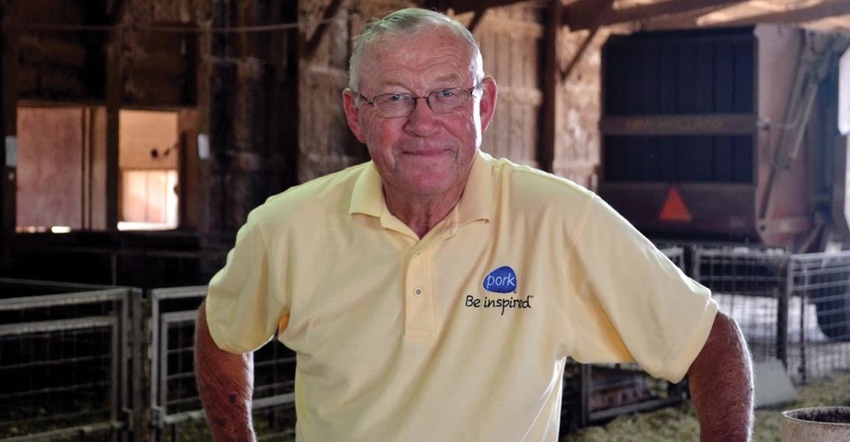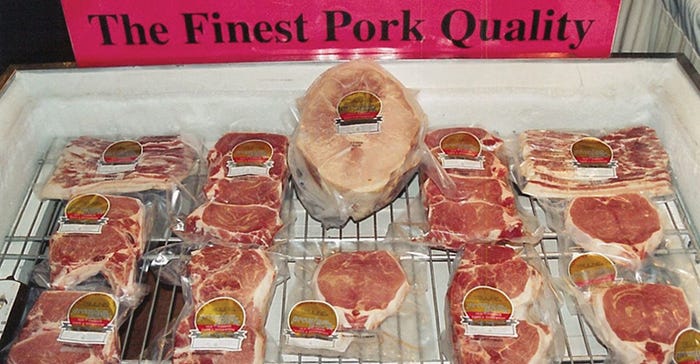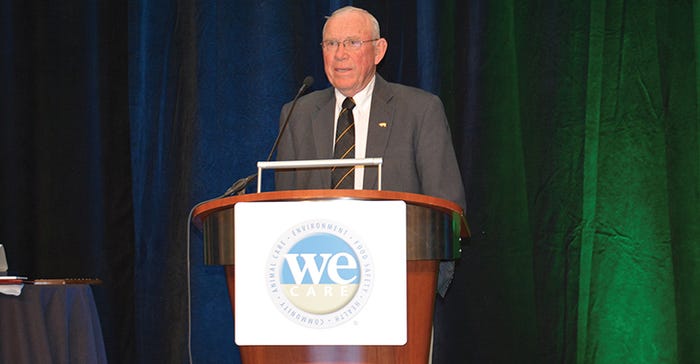'20 Pork Masters: Success breeds more success
After 50-plus years in swine breeding, premium pork production, Everett Forkner says it's about positivity, good people.

The best decision Everett Forkner ever made was marrying his wife, Ruby, in 1958. His second-best was joining his cousin to enroll in classes at the University of Missouri in the fall of 1957. The experience was a game-changer.
"We were southwest Missouri kids that hardly knew what the university was, so it was the best thing that ever happened to us. We were scared to death that they'd flunk us out, so we kept our noses in the books, and we both made the dean's list first semester," Forkner says.
"We did graduate first and second in our class of 12 in the country school, but we were a long way from the big city," he says. "We finally figured out that we could compete, maybe we could be successful at that level. And that first semester at school was really important."
In fact, the 81-year-old Richards, Mo., pork producer says that first year at Mizzou was so influential, he can't imagine what career path he would have chosen if he had not set foot on campus.
"To pinpoint it, my drive comes from the opportunity that I was given when I made the fortunate decision to enroll with University of Missouri College of Agriculture," Forkner says. "I had no idea that what happened my first year at the university, being exposed to some advanced livestock judging to begin with — it gave me a lot of drive and a lot of satisfaction."
World acclaim
Now known internationally for his swine breeding business, Truline Genetics, as well as his premium pork production and marketing business, Truline Premium Pork, Forkner says that livestock judging experience and exposure to purebred pig production at the university started it all and is the reason he still devotes so much time to it.
"Thousands of young people have been through here, doing livestock judging, workouts with them, speaking to them," Forkner says. "I love to speak to young people to encourage them. And so that's probably, more than anything else, success breeding more success — and finding out what your real capabilities are."
That leadership in the breeding stock industry is what drove Steve Brier, a southern Indiana native, to come to Missouri after college and work for Forkner.
"He was one of the early people to really use performance measures to select breeding stock," says Brier, who is now a production director for Smithfield Hog Production's Midwest division.
"Everett was visionary with pork quality; he always looked at his end product," Brier says. "And Everett cared about what the consumer was going to consume. He was selecting pork that would have the ultimate eating performance."
"Everett is a gentleman, a family man, a good pork producer and a leader. He's just the real deal," says Scott Hays, a fellow Missouri pork producer and National Pork Producers Council board member. "You trust what he says, and you know if he's giving you advice, it's in your best interest and not some hidden agenda. Everett's heart is always in the right place."
Being in the right place at the right time is what led Forkner to his leadership, advocacy and innovative production practices, and for these contributions and many more, we recognize Forkner as one of National Hog Farmer's 2020 Masters of the Pork Industry.
From cows to sows
Born Feb. 10, 1939, Forkner was raised on a small 300-acre crop farm near Nevada, Mo. The third of five children, Forkner gained a strong work ethic on the farm and in showing Hereford cattle. Attending college and working in the livestock industry hadn't crossed his mind until his senior year of showing at the Missouri State Fair, when he met a future cattle business partner and a junior at Missouri State University who encouraged him to enroll.
Forkner hit the ground running once he reached the Columbia, Mo., campus and one of the first courses he signed up for was Little International. An animal husbandry event, the classwork was to take care of either a pig, calf or sheep for the six weeks ahead of the livestock evaluation event, as well as do some lab work and livestock judging. The only stipulation was you had to pick an animal you did not have prior experience with.
"That was the first time I ever showed a pig. I got right up there, top end, and then the other part of it was a livestock judging event with six classes of livestock. Lo and behold, I won that whole thing, both sides of it," Forkner says. "So that was the real inspiration, I guess, for me to think 'Hmm, if I do that once, I ought to be able to do that again.' Maybe not quite that fast, but it was a confidence builder because I was able to be successful in a new venture."
Durocs and a degree
As Forkner's interest in pigs continued to grow during college, Forkner's father decided to convert an older brooder house on the farm into five farrowing stalls. Since he was going home every weekend anyway, Forkner was able to able to help build the stalls and take care of the 10 bred gilts.
He also continued his education on campus, taking swine reproduction classes and completing independent study credits on meat types by sires. Meat type certification programs were just being implemented and very few people were involved in that at the time. Forkner chose the Duroc breed as he knew a breeder close to the family farm that had some bred gilts.
From there, Forkner says his interest in the Duroc breed grew, and when he came back to the farm his senior year, he bought 10 purebred registered gilts and a boar — a decision he says almost cost him his marriage.
"When I bought my first 10 gilts, I went to three different breeders in the state of Missouri that I already had researched, and bought a boar that was on the cutting edge of a pretty good litter that had back fat and growth figures with him. Of course, you could buy good purebred gilts for $150 and a purebred boar for $300 at that time," Forkner says. "Well, this was a special litter, and I thought it was worth it, so I gave $750 on that trip up there.
"When I come back and walked into my trailer house, Ruby said, 'Did you buy anything?' I said, 'Yes ma'am, I gave $750.' I was pretty sure if we survived that, we could stay together."
When Forkner graduated in 1961, second in his class, he left with a wife, a degree, one son and one on the way, — and a new pig business just beginning to flourish.
Tech leads to Truline
Shortly after Forkner's graduation, the University of Missouri started working with ultrasounds on livestock for experimental purposes. Forkner was the first producer to try out the new technology on his herd, estimating fat depth and lean carcass data.
Because of the cutting edge work he was able to do with that, Forkner immediately began carcass evaluations on the pigs that he had. By 1965, his litters were testing high, and he decided to load up a boar and show it at the Missouri State Fair. There it won Junior Champion and Grant Champion titles.
"So, we had our first production sale built around him in the fall of '65," Forkner says. "I guess it kind of grew from there."
By the end of the 1960s, Forkner saw a need for more breeding programs and maternal lines and added Yorkshire Large White and Landrace breeds which allowed Forkner Farms to sell a breeding rotation to other producers.
In the 1990s, Forkner expanded the business to a breeding systems approach, with two or three gilt multipliers, so producers could make their own females.
Today, Forkner's business, Truline Genetics, consists of five purebred breeds and has gained a national and international reputation for its breeding animals and swine genetic contributions.
A network of affiliated producers has been developed to produce an annual volume of 10,000 Truline and White plus gilts and 1,500 boars that they offer for sale nationwide. They have marketed swine breeding stock into 48 states and over 25 countries worldwide.

Premium pork
In the early 2000s, as the industry began to turn to European genetics for efficiency, Forkner recognized another opportunity. Because the European pigs were lean and grew well, they were efficient, but Forkner says meat quality was poor and the breeds were more vulnerable to health issues because they lacked fat cover.
"We got into more of carcass evaluation work, and you could see it was going down. It was worse than when we first started those evaluations, the first 20 years I got out of the University of Missouri. And so there was an opportunity there for meat quality, and that's where we jumped in," Forkner says.
Through a commitment to performance testing and meat quality, Forkner built a reputation as a premier pork supplier. Today, Truline Premium Pork, is a coordinated production and marketing program of natural premium pork produced by a network of certified independent producers. For the last 11 years, Forkner's hogs have been in a no-antibiotic-ever program, but admits it was a steep learning curve at first.
"I knew from past experience in watching the industry that the real super-lean kind of frailer-made hogs that were coming out of the European breeding programs were very prone to health issues, more than the American U.S.-bred hogs at home," Forkner says. "So I immediately tied together in my mind that some kind of a marriage had to take place if we wanted to get antibiotic-free with a more robust, healthier, easier-raised, managed, temperament hog if we wanted to be successful."
Forkner says they began in earnest but because he was using true-line genetics that were line-bred with common genetics to keep the good traits and eliminate the poor, he found it easier to adapt to an antibiotic-free program. He did make changes to his nutrition program, working with companies such as Alltech on antibiotic-alternatives and feed additives, as well as pharmaceutical companies on an autogenous vaccine program, but he also changed his herd management.
In 1998, Forkner Farms built three wean-to-finish barns, the first to be built in the state of Missouri. After the barns went up, Forkner says it became apparent that increasing the weaning age would be beneficial and decided to change his system from weaning at day 21 to day 27.
"That's three times as much time for his body and his immune response to become active and stronger so that we could go bypass the nurseries and go directly into those wean-to-finish barns, and we've been very successful doing that," Forkner says.

Everyone's important
Throughout his career, Forkner has strived to not only improve his operation, but also help the industry as a whole.
Forkner was at the forefront of educating consumers about responsible farming, leading to the formation of the industry's Pork Quality Assurance program in 1989. Throughout his career, he has sat on several breed association boards, served with the Missouri Pork Association and participated on national pork industry committees. In 2012, he was named president of the National Pork Board, continuing his willingness to share his experience and commitment to the industry.
"All of those that see the invisible can do the impossible," Forkner says. "Once you have some success like I was able to have, then you begin to believe in yourself and believe in others, and you motivate the others around you to see the same vision that you see. And if you get enough people motivated, you know, it's a good chance you can make it happen."
In March at the National Pork Industry Forum, Forkner was inducted into the National Pork Producers Council's Hall of Fame.
"With more than 50 years of service to producers in Missouri and around the country, Everett Forkner's career is the very definition of a lifetime commitment," said David Herring, NPPC past president, at the ceremony. "His leadership, passionate advocacy on animal health and sustainability, and innovative production practices are widely recognized by pork producers. For his ongoing success and leadership in our industry, we are pleased to induct Everett into the NPPC Hall of Fame."
Throughout his career, Forkner has never forgotten about his auspicious start in livestock judging at Mizzou and has been paying it forward to thousands of young people ever since. An avid supporter of "youth in agriculture," he has provided hundreds of livestock judging workouts at farms; livestock judging classes at the American Royal, as well as other Midwest livestock judging events, for more than 20 years; and assistance to 4-H, FFA and college students over the past 40 years.
Forkner says what drives him to give back to the industry and his community is to try to get the most and best out of the people he interacts with.
"You know, none of us is as good as all of us," Forkner says. "Everyone's important."
Family first
Some of the most important people in Forkner's life have been his family and that begins with his wife, Ruby.
"I keep telling her, 'I didn't marry you for all the things that you think you have to do," Forkner says. "I said, 'I married you because I can always count on you. And I know exactly how you operate, and I know exactly how you think, and I like the way you operate and I like the way you think.' "
The Forkners have three sons — Mike, Doug and Steve, and one daughter, Cindy Beisly. Steve and his sons are the only ones directly involved in the operations today, but Forkner says he is in no hurry to pass the reins over yet.
People business
Looking back over his 50-plus years in business, Forkner says he never experienced any major setbacks that deterred his progress and eventual success, but there were many bumps in the road.
"I think the most important thing in my life — it's just been staying positive and relying on people around me, or that I can be in contact with, that challenge me," Forkner says. "I think if you spend time with the people that challenge you, that's probably the most important thing that you can do, and they're there. One of the things you have to be able to do is recognize them."
Forkner may be known nationally for his success in the pig business, but to him it's always been a people business.
"I think life is a people business, and you need to surround yourself with people that you know or would like to know," he says. "You always learn more by listening instead of talking."
Forkner credits success, measured in happiness or fulfillment, as coming from people — "people that are closest to you first, and then the people that you respect."
About the Author(s)
You May Also Like





